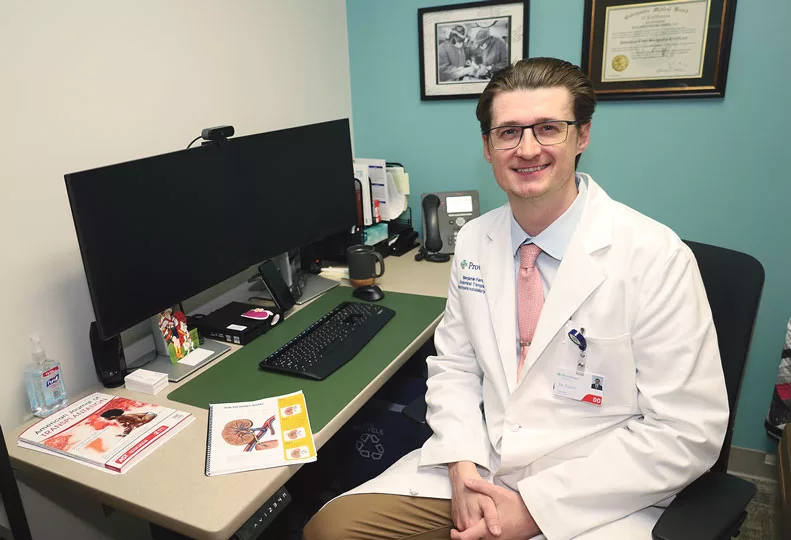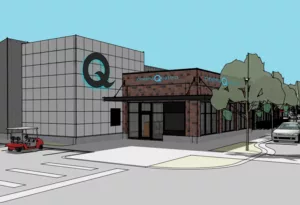
Kidney transplant procedures increase at Providence
Growth in care team, increase in donor organs aid lifesaving procedure

Dr. Benjamin Ferrel says 80 kidney transplants are within reach for the Providence team this year, up from just under 60 last year.
| Mike McLeanA medical team at Providence Sacred Heart Medical Center expects to follow last year’s record number of kidney transplants with significant growth this year.
A total of 59 transplants were conducted at the hospital last year, up from 35 in 2023.
“We expect numbers will increase this year,” says Dr. Benjamin Ferrel, who came to Sacred Heart in October, bringing the number of surgeons in the kidney transplant program to four.
A dozen kidney transplants were conducted in January, a number that wasn’t reached last year until April.
While Ferrel doesn’t expect that pace every month, he believes 80 transplants are within reach for the year.
He attributes the rise in such procedures to growing surgical and nephrology providers in the program, a record number of donors, and new technology.
Sacred Heart brought two transplant nephrologists into the program last March, and another may be hired within a few months, he says. Transplant nephrologists are specialists in kidney disorders who provide care to transplant patients before and after surgery.
“A bigger team allows us to do more transplants and put more people on the transplant list,” Ferrel says.
The larger team also can perform more complex procedures.
For example, Ferrel says the team recently performed an unusual transplant involving an abnormally shaped donor “horseshoe” kidney, which was split into two functioning kidneys to benefit two transplant patients.
The ability to take on complex procedures enables the team to perform lifesaving transplants on patients who are sicker than previously accepted for a transplant, he says.
All of that could be contributing to shorter times on the waitlist here, Ferrel says.
“Wait times traditionally have been four to five years,” he says, adding that’s trending lower to a range of about three years.
“Just this year, we did transplants for a few people who were on the waitlist for less than one year,” he says.
Another contributor to the shorter waitlist is a rise in the number of organs secured through organ procurement organizations.
Sacred Heart works with United Network for Organ Sharing, which manages organ-donor lists and assists in matching organs from live and deceased donors with patients.
Most transplanted organs come from deceased donors, and improvements in technology are helping organ procurement organizations and transplant teams recover more viable organs than ever before, Ferrel says.
“We’re seeing more donor (organs) that traditionally might not have been considered good candidates being more able to be transplanted successfully,” he says.
Ferrel says Sacred Heart soon will receive a specialized organ profusion pump that will enable organs to be procured from a larger geographical area.
“It’s remarkably inexpensive, adding about $5,000 to the transplant,” he says. “That’s offset by improvement in the kidney function.”
The pump is about the size of a large microwave oven. It provides an organ arriving at the hospital with oxygen in a solution that helps preserve viability.
Ferrel says he hopes to raise awareness of the live donor program.
“We would like to get the word out,” he says. “A lot of people don’t know it’s an option.”
He says live donors go through a thorough matching process that also ensures the donor is in good health and won’t be harmed by donating a kidney.
The transplant operation typically takes a few hours, and the patient remains in the hospital about two days, while a live donor typically has a two-day hospital stay, he says.
Patients usually have 8 to 12 hours’ notice to head to a hospital when a deceased-donor kidney becomes available.
Ages of kidney transplant patients in the Sacred Heart program have ranged from 18 to 75, although the typical age is in the late 50s to early 60s.
According to United Network for Organ Sharing data, nearly 90,000 people were on waitlists for kidney transplants throughout the U.S. as of September, which is more than three times the number of kidney transplants performed in the U.S. in all of 2024.
Sacred Heart officials didn’t immediately provide a range of cost estimates for kidney transplants, citing a multitude of variables per patient. National Institutes of Health data suggests the procedures cost well into the hundreds of thousands of dollars.
Ferrel says he doesn’t get involved in such finances, but patients are requested to have some form of health insurance, which can be private, or Medicare, or Medicaid.
Patients who need kidney transplants are experiencing renal failure, which often is caused by high blood pressure or diabetes, he says.
Some transplant patients have been on dialysis—a mechanical form of renal therapy that externally performs the waste-filtering function of a kidney.
“In a perfect scenario, a patient would be in late stages of renal failure, but able to avoid having to go on dialysis,” Ferrel says.
He says it takes more than the surgical crew to care for a kidney transplant patient. Additional team members perform pretransplant care for patients waiting for the operation, and posttransplant care providers help manage medications such as immunosuppressants, which patients take to prevent physical rejection of the transplanted organ.
Four kidney transplant programs are active in Washington state, and three of them are in the Seattle area, Ferrel says. Kidney transplant patients come to Sacred Heart from Eastern Washington, North Idaho, and a large area of Montana.
The first successful human kidney transplant was received by one identical twin from the other 71 years ago, according to the website for Brigham & Women’s Hospital, where the surgical milestone was reached. The surgeon, Dr. Joseph Murray, received a Nobel Prize in 1990 for his transplant work and subsequent research on immunosuppressive drugs.





